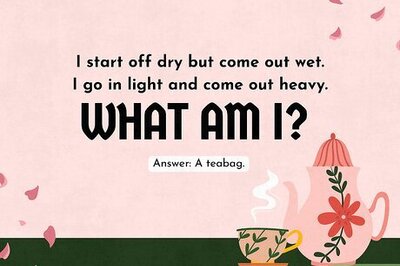
views
Now that budget 2011 will soon be upon us, tax gurus have been laying down their list of expectations. What will the budget deliver on taxes?
Where, on one hand, corporate tax lawyer HP Ranina believes the settlement scheme may be widened and a rollback in excise duty relief is likely this budget, Dinesh Kanabar deputy CEO and chairman, tax at KPMG says there is a need to abolish surcharge. He, however, expects no significant announcements on DTC or GST.
Below is a verbatim transcript of their interview with CNBC-TV18's Udayan Mukherjee and Mitali Mukherjee.
CNBC-TV18: Are you expecting anything for personal income tax at all in this budget, any tinkering with exemption limits etc?
Ranina: Yes. I am expecting that the Finance Minister will be sensitive to the problems of the middle class as far as inflation is concerned. Therefore, increase the exemption limits and possibly also maybe restore a standard deductions for salaried employees. So, certainly, on that front, individual tax will be reduced to some extent. It will be more of a cosmetic change. But I think he will show us sentiment that he is very concerned about the problems of the middle class Indians.
CNBC-TV18: If your expectations on exemption limits and standard deductions come through, how much tax saving could it entail at that kind of income bracket for an individual roughly?
Ranina: Yes. As I said the cosmetic in the sense that he may increase it by Rs 10,000 or Rs 15,000. That is all. So, really the difference would be about a Rs 1,000 because of the first slab is 10 per cent on income between Rs 5 lakh and Rs 1,60,000. So, it would be a small saving. But it is more a matter of showing concern rather than giving any substantial benefit to the tax payer.
CNBC-TV18: All action to be concentrated on the lower slab though, no action on the slabs above that because the government has been quite vocal about finding some ways to cleanse the black money routing.
Ranina: That is a separate issue altogether. That does not concern the common man. What he will do is that he will maybe widen the scheme, which we already have under the income tax law, what is called the settlement scheme. The settlement scheme as you know has been in force for the last 20 years where people can voluntarily go to the settlement commission, make a full disclosure and claim immunities from penalties and prosecution. I think it will widen the scope of that, in order to attract people who are kept money outside India, wealth outside India. That is what I expect him to do.
CNBC-TV18: Just to attack corporate taxes first, request has been to bring it down to somewhere close to 27 per cent, but do you expect to see any change on corporate tax rates?
Kanabar: Given the fact that Direct Tax Code is around the corner, I do not see the Finance Minister really tinkering with rates at this point of time because there are some counter balances which one need to take. But I do see the need and the rational for abolishing the surcharge. If that was to happen that itself would be a very welcome step. We would have an effect rate of 30 per cent rather than 30 per cent plus surcharge.
CNBC-TV18: What do you expect to hear on GST and DTC? Anything specific in terms of implementation timelines, introduction of bill in this session, what should one expect reasonably?
Kanabar: In terms of DTC where we are factually today is that the bill has been referred to the standard committee of the Parliament. The standard committee has been meeting the various stakeholders. It is expected that probably somewhere around July, the standing committee is going to make its recommendations to the government.
We will have to wait and see what sort of recommendations come because if you know what will happened in case of the Companies Bill, that is spate of recommendations which came in and the Companies Bill is being now reviewed in light of those recommendations and that is taking a life of its own. Depending on how that happens, probably the ability of the government really on DTC is to put the bill for the Parliament’s consideration somewhere in the monsoon session.
I really do not know what the Finance Minister can do except to make just this reference to stay that we are waiting for the recommendations of the standing committee.
As far as GST is concerned, the Finance Minister has taken a bold step and he says that he now wants to go ahead and introduce the constitutional amendment bill in the house of the Parliament which is going to be a post budget event. He may just talk about what he wants to do. But I don’t really see any significant announcements on either of these two legislations as a part of the Finance Minister’s budget speech really.
CNBC-TV18: You said no change in corporate taxes, but in reference to service tax and excise, do you expect any kind of upping where in partial stimulus withdrawal?
Kanabar: It is a very interesting question and it has got a wider ramifications. On one hand, the Finance Minister is dealing with inflation. And one would need to see really how he rebalances the indirect taxes such that the overall kitty increases and yet at the same time you are not giving a push to the inflation.
Let me tell you what I mean. One way is to go back and say that I am going to increase the rate of service tax and get it closer to rate which one is going to converge at the time of GST.
The other is to say that can we really broaden the base for service without increasing the rate. So, today what we have is that every year you tinker with service tax and you add two more services and go on expanding the base. Is that the right way to go or can you go back and say that every single service is going to be subject to service tax, subject to certain services being exempt? That is a better way of approaching this entire subject than to go around the way we are doing today.
CNBC-TV18: From the stock markets point of view, any changes you are expecting to hear either on dividend distribution tax or an STT?
Ranina: I don’t think that there will be any tinkering with the Dividend Distribution tax (DDT) or the MAT or any of these provisions. In fact as you know the Economic Advisory Council has said you must bring about fiscal consolidation. So, I have a feeling that possibly he will increase the excise duties, rollback on them and maybe give a few corporate sops by increasing hiking the depreciation rate saying that we need more investment in the capital goods industries, which has now been flat for the last many years. So, I have a feeling that excise will go up.
Customs may be reduced in order to take care of the increase in the fuel price, crude oil prices. But as far as the corporate sector is concerned, the only sop that I foresee is hike in depreciation rates.
CNBC-TV18: That is an interesting point because a lot of industries including the automobiles are actually banking on some kind of excise duty relief, you are saying it is possible that Finance Minister moves upwards and not even at a neutral rate?
Ranina: Yes, he is going to rollback the earlier stimulus that is the report of the Economic Advisory Committee headed by Dr Rangarajan and he says we want more fiscal consolidation. Therefore, I think he will rollback the excise but give some sops selectively by increasing the higher depreciation rates.
CNBC-TV18: Do you agree that the surcharge in corporate taxes might go?
Kanabar: I think there is a strong need to do that. I do not know whether it will go or not, but I would really hope that the Finance Minister is pragmatic enough to do away with the surcharge. That is something which the industry has been clamouring for a long time. The surcharge was introduced as something which was a couple of year phase that years have rolled into more and more years. There is no reason for it to continue.


















Comments
0 comment